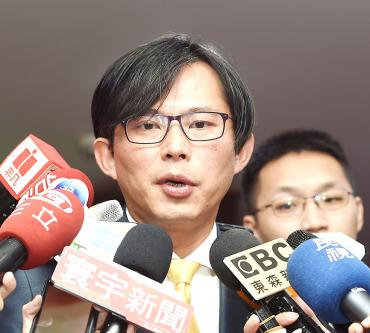New Power Party (NPP) Legislator Huang Kuo-chang (黃國昌) yesterday accused Kaohsiung Mayor Han Kuo-yu’s (韓國瑜) father-in-law’s family of occupying more than 1 hectare of public land in Yunlin County for 19 years.
During an interpellation session at the Legislative Yuan’s Finance Committee, Huang said that the family of former Yunlin County councilor Lee Jih-kuei (李日貴), Han’s father-in-law, had allegedly occupied the land since 2000 and did not return it to the government until August this year.
Between 2002 and 2008, the family twice offered to buy the land from the government, but without success, he said, following up allegations he made on Friday that Han, the Chinese Nationalist Party’s (KMT) presidential candidate, and his wife, Lee Chia-fen (李佳芬), were involved in illegal gravel excavation along a bank of the Jhuoshui River (濁水溪) in Yunlin County.
Between 1998 and 2005, Da-tong Gravel Co (大通砂石行), owned by Lee Jih-kuei, was fined multiple times for illegally occupying public land and storing gravel in the area, Huang said on Friday.
National Property Administration (NPA) Director-General Tseng Kuo-chi (曾國基) told the Finance Committee that the central government had not leased the land to the Lee family between 2000 and 2005, but in 2006, the Yunlin County Government agreed to the family’s 10-year plan to develop the area into a recreational farm.
However, in June, just three months before the contract was due to expire, the NPA discovered that the project had not been carried out, which is why the land was returned in August, he said.
To determine if the family had illegally excavated gravel, the NPA has applied for aerial shots of the area, he said, adding that an investigation would take two weeks.
Describing the Lee family’s use of the land as “privileged people stealing national resources,” Huang yesterday asked why authorities had not asked them to return the land until this year.
“I demand that the Ministry of Finance thoroughly investigate the matter to find out if there has been any abuse of power or other illicit behavior,” the lawmaker posted on Facebook later in the day. “We cannot tolerate local political factions that abuse national resources to promote their own interests in such a blatant way.”
In related news, Han spokesman Ye Yuan-zhi (葉元之) yesterday filed charges against Huang at the Taipei District Prosecutors’ Office for trying to influence the presidential election by spreading false information about Han, while in an interview with TVBS, the mayor urged Huang to talk with prosecutors if he had any evidence of wrongdoing.
“In the past couple of days he did not take any legal action, so today we are suing him, because we have done nothing wrong,” Han said.
Asked about reports that Yunlin County Council’s 1992 meeting minutes showed Lee Jih-kuei had said that “my Mainlander son-in-law [Han] decided to run for legislator after seeing the way I am making money for two months,” Han said the remarks were unrelated to Lee’s gravel business.
“What have the meeting minutes got to do with illegal gravel excavation?” he said, adding that certain media outlets are “committing murder with headlines.”
Source: Taipei Times - 2019/12/03





















